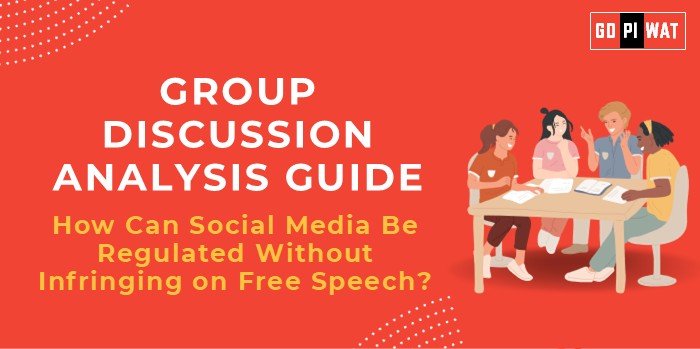📋 Group Discussion Analysis Guide
🌐 Topic: How Can Social Media Be Regulated Without Infringing on Free Speech?
🌟 Introduction to the Topic
Opening Context: “The global explosion of social media use has ushered in a new era of connectivity, but it also presents critical challenges such as the unchecked spread of misinformation and hate speech. Striking a balance between regulation and free speech remains pivotal in this digital age.”
Topic Background: Since the proliferation of platforms like Facebook, Instagram, and TikTok, nations have grappled with policies to safeguard user experiences while respecting fundamental freedoms. The European Union’s 2023 Digital Services Act is a milestone in addressing these concerns globally.
📊 Quick Facts & Key Statistics
- 🌍 Social Media Users Worldwide: 5.04 billion (October 2024) – 62.6% of the world’s population demonstrates its ubiquitous influence.
- 📉 Misinformation Impact: One-third of 200 million daily American users distrust social media information (2023) – Highlights the need for credibility mechanisms.
- 📜 Regulation Landscape: The EU’s Digital Services Act (2023) mandates algorithm transparency and swift removal of illegal content.
- 🗣️ Hate Speech Reports: Facebook removed 25.2 million pieces of hate speech content globally in Q2 2023 – Reflects ongoing moderation challenges.
🧑🤝🧑 Stakeholders and Their Roles
- 🏛️ Governments: Develop and enforce balanced regulations protecting free speech while curbing harm.
- 💻 Tech Platforms: Invest in AI moderation and comply with national laws.
- 👥 Users: Maintain ethical online behavior and report harmful content.
- 📢 NGOs: Advocate for fair regulations safeguarding rights and inclusivity.
- 🌏 International Bodies: Promote cross-border policy frameworks to ensure consistency.
🏆 Achievements and Challenges
🎉 Achievements:
- 📖 Enhanced Transparency: The EU’s 2023 Digital Services Act sets global standards for algorithm transparency.
- 🤖 Moderation Efforts: Platforms like Facebook leverage AI to detect hate speech and misinformation effectively.
- 🌐 Cross-National Policies: Increasing global alignment on content moderation strategies.
⚠️ Challenges:
- ❌ Misinformation Pervasiveness: Distrust in social media content undermines its societal value.
- ⚖️ Legal Overreach: Risks of disproportionate government control over platforms.
- 📉 Technological Gaps: Moderation AI often fails in nuanced cultural contexts.
🌍 Global Comparisons
- 🇪🇺 EU: Digital Services Act exemplifies balanced regulation.
- 🇺🇸 US: Reluctance to impose stringent laws owing to First Amendment protections.
- 🇨🇳 China: Prioritizes strict control, sparking global debates on freedom.
📋 Case Studies:
- 🇮🇳 India: IT Rules 2021 mandate strict intermediary accountability but face legal challenges.
- 🇦🇺 Australia: Strong takedown policies have effectively reduced extremist content post-2019.
🗣️ Effective Discussion Approaches
📌 Opening Approaches:
- 🌐 Start with data: “With 5.04 billion social media users globally, the challenges of misinformation and harmful content are immense.”
- 📖 Case study highlight: “The EU’s Digital Services Act offers a roadmap for balancing regulation and rights.”
🎭 Counter-Argument Handling:
- “Concerns about overreach are valid, but robust transparency mechanisms can mitigate misuse.”
🔍 Strategic Analysis of Strengths & Weaknesses
- ✅ Strengths:
- Encourages responsible use.
- Enhances user safety.
- ❌ Weaknesses:
- Risks undermining freedom.
- Implementation inconsistencies.
- 📈 Opportunities:
- Develop global frameworks.
- Innovate in moderation technologies.
- ⚠️ Threats:
- Growing mistrust.
- Authoritarian misuse.
📖 Structured Arguments for Discussion
- ✅ Supporting Stance: “Regulations like the EU’s ensure safety without compromising user rights.”
- ❌ Opposing Stance: “Excessive government intervention could suppress dissent and creativity.”
- ⚖️ Balanced Perspective: “Transparent and collaborative regulation can uphold both safety and freedom.”
🎓 Connecting with B-School Applications
- 📘 Real-World Applications:
- Ethical governance, digital strategy, and legal policy frameworks.
- 📋 Sample Interview Questions:
- “What global lessons can India adopt in moderating social media?”
- “How should businesses navigate content regulation policies?”
- 💡 Insights for B-School Students:
- Focus on balancing innovation with ethics in digital business environments.


